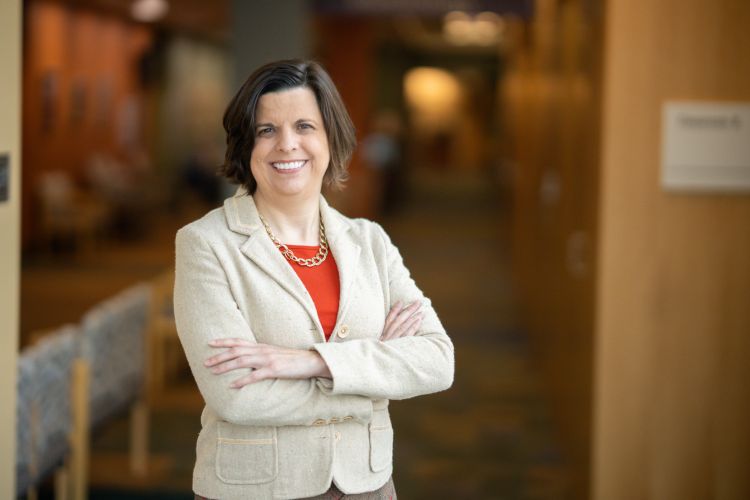Women in Medicine: Elaine Pelley, MD

The American Medical Association recognizes September as Women in Medicine Month, honoring the significant contributions of women to the field of health care.
Throughout the month, the Department of Medicine will feature Q&As with a handful of our own women physicians across a variety of specialties and at different stages in their careers.
Elaine Pelley, MD, professor, Endocrinology, Diabetes and Metabolism, is an endocrinologist and a leading voice in the area of gender equity in medicine. She directs the University of Wisconsin (UW) Endocrinology Fellowship.
How has being a woman shaped your career in medicine?
My medical school graduating class was nearly 50% women. I think most of my female classmates expected that being a woman would have little to no impact on our careers.
However, there is a phenomenon that has been described as “late-breaking sexism,” where women enter their careers sensing minimal gender bias, but then find that, 10-20 years later, they have fallen behind where they expected or hoped to be, and certainly behind male peers. This perception is real in medicine—the gender gaps in professional advancement for physicians are well-documented. These result from the many subtle and not-so-subtle ways that society’s gender stereotypes infuse into the workplace.
I am so proud of, and grateful for, the women physicians in my life that have been friends, colleagues, mentors, and role models of excellence for the nearly 3 decades I have spent in medicine.
Women in Medicine Month is an important time to celebrate the work we do and all we have and will accomplish. But it is equally, if not more, important to use this time to highlight the challenges women physicians still face: pay gaps, higher burnout risk, gender-based expectations, and policies that fail to acknowledge the disproportionate caregiving burden women bear.
Who have been your greatest personal and/or professional mentors as women in medicine, and why?
Many women physicians have supported me along my professional path.
My fellowship continuity clinic preceptor, Dr. Geetha Gopalakrishnan, inspired my career in osteoporosis care and, years later, nominated me for my first national committee role. This action launched a nearly 10-year tenure in multiple leadership roles in the Endocrine Society which was key to my promotion success.
Dr. Molly Carnes, a local and national leader in gender research, provided the mentorship I needed to turn my Grand Rounds idea about exploring the effects occupational gender segregation in medicine into a 2020 Academic Medicine Perspective paper.
That paper focused on gender disparities in medical specialties and was the subject of this 2020 DOM article. How has your work in this area advanced or changed since?
The Academic Medicine paper was a labor of love and intended as a call to action.
As an endocrinologist, I am part of a specialty where women are over-represented. As such, I became fascinated with (and, honestly, worried by) the expected ramifications of specialty gender segregation.
In the US workforce, it is well-established that entry of women into any occupation leads to (1) a decline in perceived prestige, (2) a decline in that occupation’s earning potential, and (3) a decline in men pursuing that occupation.
We sought to explore whether this was also true in medicine. Spoiler alert: it appears to be.
The paper has been cited nearly 80 times in the intervening four years, mentioned over 1,000 times on X, as well as in media outlets such as The New York Times, Forbes, and The Atlantic. I am extraordinarily proud to have opened the door to these important conversations as well as to key work by other researchers exploring this form of gender inequity.
I have continued to speak on the subject wherever I can to raise awareness and advocate for change. I was able to engage with GEMS Alliance (Gender Equity in Academic Medicine and Sciences) who have adopted gender segregation as a one of their four main critical areas of focus to achieve gender equity. In 2023, Dr. Nancy Spector invited me to become an official part of the transformative Executive Leadership in Academic Medicine (ELAM) program at Drexel University, allowing me the unique opportunity to highlight this issue annually to a group of women who are poised to rise into leadership roles and serve as change-makers in academic medicine across the country.
Responses have been lightly edited for length.
Photo credit: Clint Thayer/Department of Medicine.